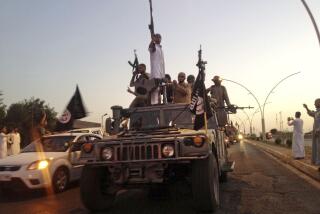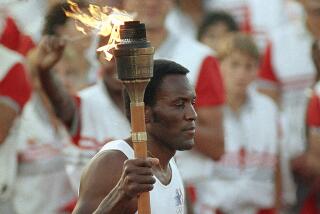REIGN OVER
- Share via
BAGHDAD — Uday Hussein, who headed Iraq’s Olympic Committee, was so feared within the country that the glee many Iraqi sports officials felt Wednesday over the prospect of his death was muted by concern that he was somehow still alive.
“We hear it’s him -- but we are not 100% sure about his death,” said Jaffer al-Muthafer, 42, a soccer player who escaped from Iraq in 1979, earned a doctorate in sports management in Germany and returned here -- to see his mother for the first time in 24 years -- in mid-May.
Al-Muthafer, who in recent months had been active in an exile group called the Free Iraq Olympic Group, added, “If it’s really him, we will be so very happy. We will really be able to start a new regime of Olympic sport in Iraq. OK, he’s gone. We start a new life.”
U.S. military authorities announced Tuesday that Uday Hussein, 39, and his brother Qusai, 37, had been killed in a firefight in the northern Iraqi city of Mosul. Gunfire, apparently celebratory, erupted around Baghdad late Tuesday as word spread that Saddam Hussein’s sons had been killed.
Saddam Hussein’s whereabouts remain unknown.
Five years after Hussein assumed power in 1979, Uday, his eldest son, took over the Iraqi Olympic Committee. For almost 20 years, he seemed to relish that post over all of his others while, at the same time, perversely ordering the nation’s best athletes beaten, tortured and jailed.
Tiras Odisho, a senior official in the 1980 Iraqi delegation to the Moscow Olympics who remains influential on the Iraqi sports scene, added, “The blackest point in our history was when Uday took over. Before him we were walking forward. When he took over, we started running backward.”
Amu Baba, a 69-year-old legend within Iraq, a star on the Iraqi men’s national soccer team a generation ago, said hopefully, “Iraq is now free from torture. Free from Uday.”
Uday Hussein had sole and unchallenged decision-making power in the realm of sports. Apparently, however, that was not enough. He used the Olympic rings to mark his territory -- for instance, putting the rings on the outside of a private hospital of which he’d taken charge.
For years, he ordered beatings and imprisonment of athletes and sports officials, often on a whim. The abuse grew worse -- and more arbitrary -- after a 1996 assassination attempt that left him with serious spinal wounds.
“I knew they were taking them to jail or beating them. But I couldn’t do anything,” said Besim Jamal Mahmod, 52, who since 1992 has been secretary-general of the Iraqi soccer federation. Uday Hussein was president of the soccer federation.
“After games, they called me from Uday’s office,” Mahmod said. “They would say, ‘This player, this player, this player.’ I would organize the players. They would sit in a room. Someone would come and take them, jail them.”
“If he would find any small mistake, he would directly punish me,” said Laith Hussein, captain since 1996 of the Iraqi national soccer team, recalling “10 or 12” times that he was jailed over the years.
Now 33, and no relation to the dictator’s family, he said, “When I became 16, I started playing for the national team.
“You can only imagine how I’ve suffered [because of] Uday. I’ve seen it all.”
In December, the human rights group Indict made the first public allegations of abuse linked to Uday Hussein’s control of the Iraqi sports program.
International Olympic Committee officials have said they received no complaints before December. In May, after finding the stories of such abuse credible, the IOC suspended Iraq from the Olympic movement.
Though the Iraqi committee remains suspended, the IOC has been working to get a new committee built and an Iraqi team to Athens for the 2004 Summer Games. An IOC task force on Wednesday completed a nine-day mission to Baghdad.
During the three-week military campaign that ended April 9 with the fall of Saddam Hussein’s government, U.S. forces bombed the nine-story Iraqi Olympic Committee building. All that remains there is the empty shell of a building.
In recent weeks, even with Hussein out of power and his sons on the lam, U.S. officials acknowledged that they were fighting a guerrilla-style war, fueled in large part by Hussein loyalists. The family’s influence on the nation remained potent, even disruptive.
Abdul Razak al-Taey, an influential Iraqi sports figure who has been working closely with officials from the U.S.-led coalition overseeing the reconstruction of Iraq, acknowledged that he frequently travels Baghdad’s streets with an armed guard.
Al-Taey and Ahmed al-Samarrai -- a former Iraqi army brigadier general who defected 20 years ago but returned to Baghdad on April 20 from Britain -- have emerged as leading candidates to take over the top positions in a remade Iraqi Olympic Committee.
“It’s dangerous for me and Al-Samarrai,” Al-Taey said a few days ago, before the firefight in Mosul.
He said he had regularly been getting “indirect” messages from supporters of the fallen regime -- perhaps even, he believed, from Uday Hussein himself.
For instance, Al-Taey said, photos of Saddam had been slid under his door.
Or, he said, the phone would ring -- but when he answered, no one would be on the other end.
“But,” he said, “I am not afraid.”
More to Read
Go beyond the scoreboard
Get the latest on L.A.'s teams in the daily Sports Report newsletter.
You may occasionally receive promotional content from the Los Angeles Times.






